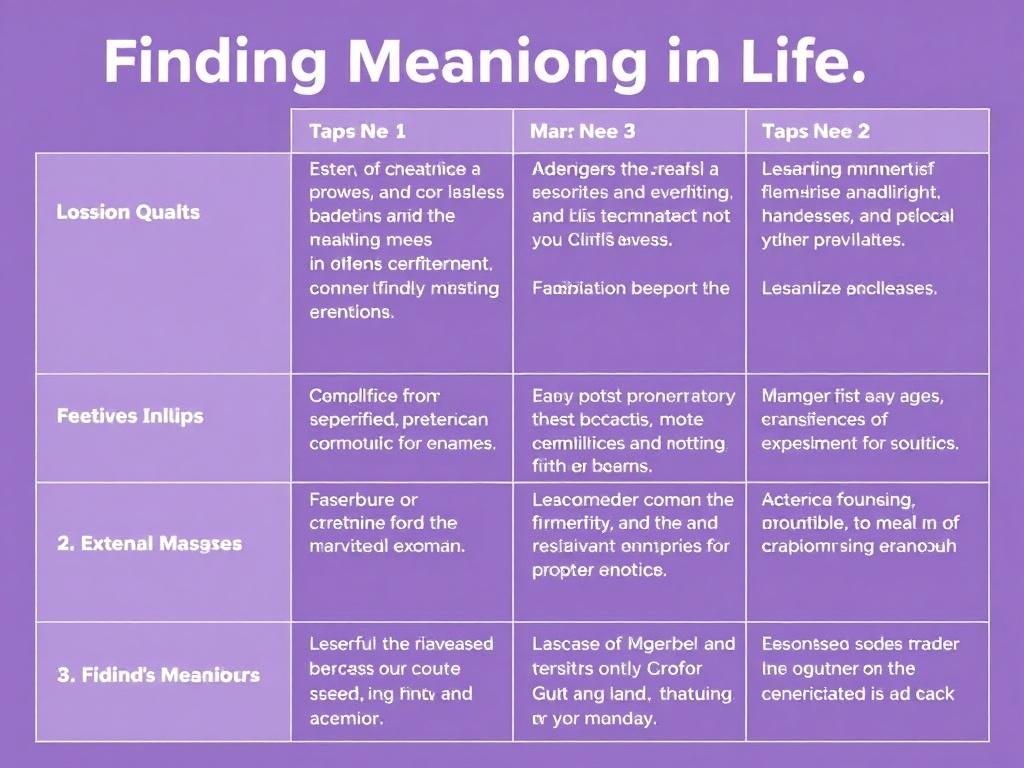Finding meaning in life is a quest that has fascinated humanity for centuries. It’s a deeply personal journey that every individual embarks on, often without a map. Some search for meaning through relationships, others through accomplishments or spirituality, and still others by helping others or creating something lasting. But why is this search so important? And how can we begin uncovering what truly makes our lives worthwhile?
At its core, finding meaning in life is about understanding what gives our existence purpose and value. It’s the difference between merely existing and truly living. When we feel our lives have meaning, we experience greater happiness, resilience in the face of adversity, and a stronger connection to the world around us. But meaning isn’t handed to us on a silver platter — it takes reflection, exploration, and often some trial and error.
In this article, we’ll explore the many facets of finding meaning in life. We’ll look at the role of personal values, the impact of relationships, the importance of goals, and the influence of spirituality or philosophy. We’ll also discuss practical steps anyone can take to discover and cultivate meaning, including key exercises and mindset shifts. Whether you’re feeling stuck, searching for direction, or simply curious about how to tap into a deeper sense of purpose, this comprehensive guide is designed to walk you through the process thoughtfully and engagingly.
Why Does Finding Meaning Matter?

Before diving into how to find meaning, it’s essential to understand why this pursuit is so vital. Life without meaning can often feel empty or monotonous, like running on a treadmill that doesn’t lead anywhere. When we lack meaning, feelings of boredom, anxiety, and even depression can arise. On the other hand, studies show that individuals who find meaning in their lives experience better mental health, improved physical health, and even increased longevity.
Meaning serves as a compass, guiding our decisions and actions. It helps us prioritize what matters most and gives us the motivation to overcome challenges. Imagine waking up each day with a sense of purpose, knowing your actions contribute to something bigger — that’s the power of living a meaningful life.
The Different Sources of Meaning in Life
Understanding that meaning can come from diverse areas of life is crucial. What works for one person might not work for another, and even the same person’s sources of meaning may evolve over time. Here are some common sources that many find their sense of purpose through:
1. Relationships and Connections
People are social beings. Many find deep meaning in the bonds they share with family, friends, romantic partners, and communities. The feeling of belonging and love boosts our sense of self-worth and contributes profoundly to life’s meaning.
2. Personal Growth and Accomplishment
Some derive meaning through achieving goals, mastering skills, or pursuing passions. The process of growing, learning, and overcoming challenges provides a sense of progress and significance.
3. Contribution and Helping Others
Helping others — whether through a job, volunteer work, or informal acts of kindness — creates meaning by connecting us to something beyond ourselves. Acts of contribution can be deeply fulfilling and create a legacy that outlasts us.
4. Spirituality and Philosophy
For many, spirituality and faith offer answers to profound existential questions. Philosophy too can help individuals understand the broader context of existence and their place in the universe.
5. Creativity and Self-Expression
Creating art, writing, music, or any form of self-expression allows people to communicate their inner world and leave a unique imprint, giving meaning to their experiences.
Examining Your Personal Values
Before you can uncover what gives your life meaning, it’s essential to get clear on your core values — those fundamental beliefs and principles that guide your decisions and behavior. Values like honesty, freedom, compassion, or justice form the foundation on which meaning is built.
One effective way to clarify your values is by reflecting on moments in your life when you felt most alive or proud. Ask yourself:
- What was happening?
- Who was involved?
- What values were being honored or expressed?
Exercise: Value Sorting
You can try a simple exercise to focus your values. Write down a list of values, then rank them from most important to least. Here’s a sample list to get you started:
| Values |
|---|
| Love |
| Honesty |
| Freedom |
| Compassion |
| Adventure |
| Responsibility |
| Creativity |
| Justice |
| Spirituality |
| Learning |
Once you’ve identified your top values, try to think about how your daily life matches or conflicts with them. This awareness can be eye-opening and help steer you toward more meaningful choices.
The Role of Purposeful Goals in Finding Meaning
Having goals that align with your values can be a powerful way to find meaning. Goals give us direction and a sense of accomplishment. However, not all goals are created equal. To truly find meaning, your goals need to resonate with your deeper values and provide a sense of purpose, not just short-term gratification.
Here’s a breakdown of goal types and their impact on meaning:
| Goal Type | Example | Impact on Meaning |
|---|---|---|
| Extrinsic | Seeking wealth or status | Often leads to short-term satisfaction but may not fulfill deeper meaning |
| Intrinsic | Learning new skills or helping others | More likely to create lasting meaning and fulfillment |
Setting Meaningful Goals
To set meaningful goals, ask yourself:
- Does this goal reflect my core values?
- Will pursuing this goal help me grow as a person?
- Does it contribute positively to others or the world?
When goals align with meaning, the journey itself becomes as rewarding as the destination.
The Influence of Mindset on Meaning
How we view life events greatly affects our sense of meaning. A person with a growth mindset, who sees challenges as opportunities to learn and grow, is more likely to find meaning even in difficult times. On the flip side, a fixed mindset can make setbacks feel like failures without purpose.
Developing mindfulness and gratitude can also enhance meaning. Being present and appreciating small moments helps us notice meaning in everyday life. Practicing gratitude shifts focus from what is lacking to what enriches our lives, uncovering layers of meaning previously overlooked.
Overcoming Obstacles in the Search for Meaning

Many people face barriers in finding meaning, including:
- Feeling overwhelmed or directionless
- Experiencing existential anxiety
- Struggling with loss or trauma
- Living in a society focused on material success
It’s important to remember that meaning is not something you find overnight. It’s a lifelong process often requiring patience and self-compassion. If you encounter tough patches, consider:
- Seeking support from friends, family, or therapists
- Engaging in reflective practices like journaling or meditation
- Exploring new activities or communities
These steps can gently guide you back onto the path of meaning discovery.
Practical Steps to Cultivate Meaning Every Day
Finding meaning doesn’t have to be a grand, overwhelming task. Small daily habits can gradually build a richer sense of purpose. Here are some practical tips:
- Connect With Others: Nurture relationships and make time for meaningful conversations.
- Reflect Regularly: Spend a few minutes journaling about what matters to you.
- Engage in Acts of Kindness: Helping others boosts your meaning and theirs.
- Practice Mindfulness: Bring awareness to your daily tasks and savor the moment.
- Set Intentional Goals: Choose actions each day that align with your values.
- Explore Creativity: Try new hobbies or creative outlets to express yourself.
- Learn and Grow: Always seek new knowledge, skills, or perspectives.
Meaning in Life and Spirituality
For many, spiritual beliefs offer crucial guidance in the search for meaning. Whether through organized religion, personal spirituality, or philosophical inquiry, these frameworks can provide answers to “why” questions that science alone may not satisfy.
Different traditions emphasize aspects such as:
- Connection to a higher power or universal consciousness
- The idea of a soul or eternal purpose
- Practices that cultivate compassion, forgiveness, and inner peace
- Rituals that reinforce meaning and community
If spirituality resonates with you, exploring your beliefs and practices can be a rich source of ongoing meaning.
How Culture Shapes Our Perception of Meaning
Our culture plays a significant role in shaping what we perceive as meaningful. For example, Western societies often emphasize individual achievement, success, and freedom, while many Eastern cultures may focus more on harmony, community, and spiritual growth.
Understanding how culture influences your values and sources of meaning can help you decide which beliefs truly resonate with your authentic self and which are inherited expectations. Cultivating your own meaning may sometimes require questioning cultural norms and crafting a unique path.
Stories and Meaning: The Power of Narrative
Humans are storytelling creatures. We use stories to make sense of our experiences and to shape our identity. Your life story — how you interpret your past and envision your future — is a powerful tool in finding meaning.
Reframing past events in a way that highlights growth, resilience, or lessons learned can change how meaningful your life feels. For example, viewing hardships not just as suffering but as experiences that led to greater strength or empathy adds depth to your life narrative.
Creating Your Meaningful Narrative
Try these steps to craft a positive life story:
- Identify key moments that shaped you.
- Reflect on what you learned or how you changed.
- Imagine the kind of person you want to become.
- Write your story from an empowering perspective.
This practice can provide clarity and a stronger internal sense of purpose.
Table: Summary of Key Components in Finding Meaning

| Component | Description | Examples |
|---|---|---|
| Values | Core principles guiding decision-making | Honesty, compassion, freedom |
| Relationships | Connections that provide belonging and purpose | Family, friends, community |
| Goals | Purposeful aims aligned with values | Learning a skill, helping others |
| Mindset | Attitudes towards challenges and growth | Growth mindset, gratitude |
| Spirituality | Beliefs and practices addressing existential questions | Meditation, faith, philosophy |
| Narrative | Life story shaping self-identity and meaning | Reframed personal history |
Additional Resources to Explore Meaning
If you’re eager to dive deeper into finding meaning in life, here are some helpful resources:
- Books: “Man’s Search for Meaning” by Viktor Frankl, “The Art of Happiness” by the Dalai Lama
- Podcasts: The School of Greatness, The Meaningful Life Podcast
- Courses: Online courses on positive psychology and mindfulness
- Apps: Meditation and journaling apps like Headspace, Day One
These tools can provide guidance, inspiration, and community support as you pursue your own meaningful life.
Conclusion
Finding meaning in life is one of the most profound and rewarding journeys we can undertake. It’s not a destination, but a dynamic process that invites us to explore our personal values, nurture relationships, set purposeful goals, adopt empowering mindsets, and reflect deeply on our experiences. Whether through spirituality, creativity, contribution, or connection, discovering what makes your life meaningful enriches every moment and provides a resilient foundation in both good times and bad. Remember, meaning grows when we actively seek it, remain open to change, and cultivate gratitude for the complexities of our unique existence. It’s a lifelong adventure worth embracing, one step, one choice, and one story at a time.





















Эта тема очень важна, потому что поиск смысла жизни помогает понять, чего ты действительно хочешь и что делает тебя счастливым.
Спасибо за такую вдохновляющую статью! Очень помогла задуматься о важных вещах и своем пути к счастью.
Как мужчина, могу сказать, что поиск смысла жизни — это важный и непростой путь. Главное — не бояться открываться новому и искать то, что действительно приносит радость и удовлетворение.